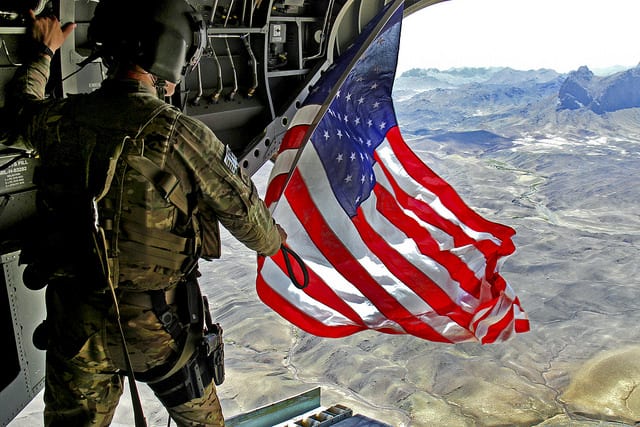 Image courtesy of Program Executive Office Soldier on Flickr.
Image courtesy of Program Executive Office Soldier on Flickr.
Democracy in Afghanistan: Elections and Progress
Taliban leaders recently met with the US envoy to Afghanistan, Zalmay Khalilzad, on October 12th to discuss an end to the US occupation of Afghanistan, according to a CNN report. The US has not yet confirmed such a meeting, but a statement from its embassy in Afghanistan noted that Khalilzad attended meetings in Islamabad, Riyadhm and Doha, and returned to Kabul to meet with Afghanistan’s President Ashraf Ghani and other political leaders. US core interests in Afghanistan continue to be the expulsion of terrorist groups and the promotion of Afghan self-governance. Currently, the Trump administration has chosen to keep 14,000 American Military troops in Afghanistan; however, without talks over improving the state of the Afghanistan government, true progress for Afghan civilians will remain slow-going.
The United States launched Operation Enduring Freedom 17 years ago to stop the Taliban from providing a haven for terrorist groups like al Qaeda. Since then, United States and its NATO allies have toppled the Taliban government and continue to fight insurgent groups. Including the US, there are currently 16,000 troops deployed in Afghanistan from various countries such as Italy, Germany, Georgia, Turkey, Romania, and 34 others. US envoys like Zalmay Khalilzad and NATO allies play crucial roles in the process of democratization, especially in Afghanistan where democracy is a relatively new concept.
A Brookings Institution report by Vanda Felbab-Brown, outlines the Trump administration’s approach to policy in Afghanistan being “…to a large extent correct.” However, as Felbab-Brown explains, a lack of emphasis on Afghan governance could be a fatal flaw to US strategy in the war-torn country:
“The United States had principally three options regarding Afghanistan: full military withdrawal, limited counter-terrorism engagement, and staying in the country with slightly increased military deployments and intense political engagement. …in Afghanistan with a somewhat enlarged military capacity—is the least bad option. However, that strategy needs to be resolutely coupled with explicit and sustained emphasis on better governance and political processes in Afghanistan and intense U.S. political engagement with Afghan governance issues.”
She continues to point out that US military involvement in Afghanistan can only be as effective as the efforts to promote Afghan governance.
While looking at the development of democracy in Afghanistan, it is important to observe how far the country has come. Open and free elections in Afghanistan, despite corruption, is a huge stride for the country. Before 2001 under Taliban rule, women’s rights were severely curtailed; banning them from public life and stripping them of some of the most basic human rights. Today, Afghanistan’s constitution mandates a certain portion of the House of Elders (parliament) be composed of women. On Sunday October 21st, over 4 million Afghan civilians risked their lives to vote in the general elections, making up more than half the eligible electorate. Afghan civilians and officials cast ballots in 32 out of the 34 total providences, postponing elections in two districts in southern Afghanistan due to security concerns and absent election officials. These shutdowns were a frightened response to the Taliban assassination of Afghanistan’s powerful police chief, General Abdul Raziq. Despite the slight resilience of these two providences, elections are expected to resume on Saturday November 3rd.
Stable democracy in Afghanistan is essential for the war-torn country to abolish practices that exclude a large majority of Afghanistan’s population from participating in government. Security and stability are essential in not only holding fair elections, but in building the foundations of a long-lasting democracy. The elections held this past weekend show the world Afghanistan is on its way to democratization and that it is possible for free and open elections to take place in one of the most dangerous places in the world.





